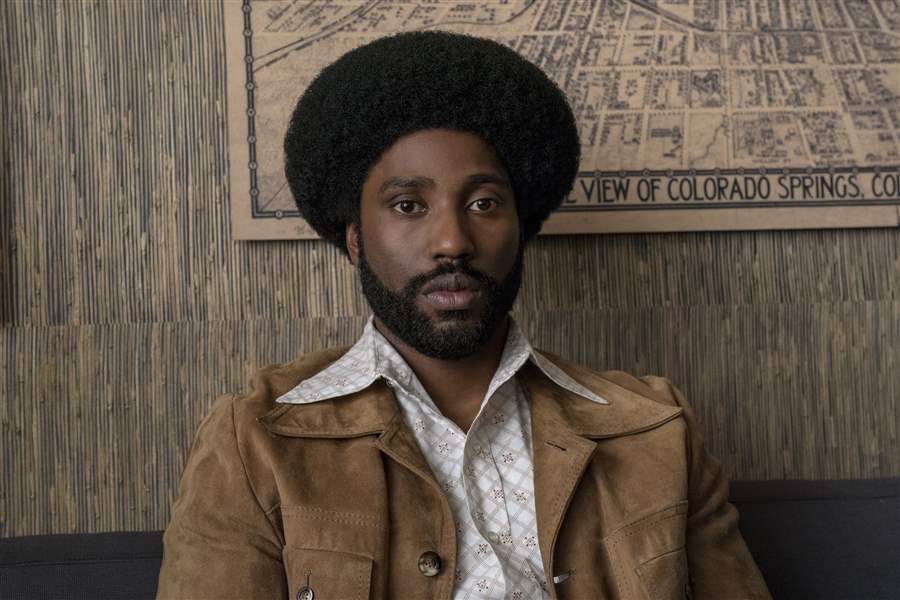
Lee's latest a powerful, imperfect examination of race relations
8/9/2018
John David Washington in a scene from "BlacKkKlansman."
Blumhouse Productions
Even Spike Lee's most ardent supporters would be hard-pressed to embrace every film in the writer-director's oeuvre. That’s true of any artist who takes chances with his or her craft rather than to settle for a career of singular self-imitation.
Lee’s latest, BlacKkKlansman, isn’t easy to embrace.
Lee as director and co-writer struggles with the film’s narrative divide as comedy and drama, two strong tones that typically dictate the entirety of a movie’s mood but can also be mixed in a difficult alchemy of precision and balance. As examples, Lee’s crowning achievement, 1989’s Do the Right Thing, comes to mind, as does last year's wickedly clever I, Tonya.
Directed by Spike Lee. Screenplay adapted by Charlie Wachtel, David Rabinowitz, Kevin Willmott, and Lee from the book by Ron Stallworth. A Focus Features release playing at Franklin Park and Fallen Timbers. Rated R for language throughout, including racial epithets, and for disturbing and violent material, and some sexual references. Running time: 135 minutes.
Critic's rating: ★★★½
Cast: John David Washington, Adam Driver, and Laura Harrier.
BlacKkKlansman is funny, and then it's not. But it’s always absurd, in that this-can’t-possibly-be-true way films sometimes are. Only, the story is true, at least most of it: A Colorado Springs’ black police detective named Ron Stallworth in the late 1970s infiltrated the the local Ku Klux Klan and kept quiet about the investigation for decades. Stallworth also recently published a book about his experiences, Black Klansman: A Memoir ($25.99, Flatiron Books).
Ron (John David Washington, Denzel’s son, in a magnetic performance) is Colorado Springs’ first black police officer, which, as the police chief (Robert John Burke) says, makes him the “Jackie Robinson” of the department, meaning he will be tested not only by racists in the city, but also fellow officers.
His police career begins in the department’s criminal records’ room, retrieving case files for other cops. Ron is miserable but guts through it. Then the chief tasks him with going undercover as a college student at a rally for civil rights activist Stokely Carmichael/Kwame Ture (Corey Hawkins), who in the 1960s gave birth to the rallying slogan “black power.” There is concern Carmichael’s appearance could incite violence. It doesn’t, but Ron’s work earns him a promotion to detective. It’s also where Ron meets civil rights activist Patrice Dumas (Laura Harrier), a woman who challenges his politics and thinking but does not necessarily sway his opinion, even as their relationship flourishes.
Patrice is fictional, by the way. Her purpose is to be a sounding board for Ron’s internal struggles as a black man in a white man’s world, as well as a lightning rod for Lee’s strong commentary about race and sexism.
It’s while sitting at his desk, looking through the day’s newspaper, that Ron responds to an ad by the nascent local Klan group seeking recruits. Thus begins a bizarre months-long odyssey as Ron plays the role of a racist white man on the phone (“I hate blacks, I hate Jews, Mexicans and Irish, Italians and Chinese. But my mouth to God’s ears, I really hate those black rats and anyone else, really, that doesn’t have pure white Aryan blood running through their veins.”)
He enlists a white and Jewish undercover narcotic officer, Flip Zimmerman (Adam Driver), as his surrogate for in-person meetings. Flip is sardonic and seemingly ambivalent about the investigation. Perhaps that’s because it doesn’t seem to be going anywhere for quite a while, other than Flip (pretending to be Ron) meeting occasionally with the local Klan group, whose leader Walter (Ryan Eggold) has embraced “Ron” as his best friend and staunch supporter of the cause.
But one member grows suspicious of “Ron” — wondering first if he is an undercover cop and later if he is Jewish — which creates some of the movie’s drama as Flip's life is often at risk.
WATCH: Official trailer of BlackKkKlansman
Lee juxtaposes those scenes with more lighthearted moments, which are just as chilling, such as Ron’s phone conversations with David Duke, then Grand Wizard of the Ku Klux Klan, who also became a real-life admirer of “Ron,” even personally processing his application into the group. Topher Grace plays Duke. The actor bears an uncanny resemblance to the hatemonger-turned-Louisiana politician, but he never truly sheds the identity that comes with being most famous as a TV sitcom star.
But there are also those over-the-top moments and characters, such as the June Cleaver-type wife who wants nothing more than to make a difference in the Klan’s cause by killing blacks, that wouldn’t pass muster on a Disney Channel series. As the movie steams ahead and the stakes increase, the inauthentic humor only gets in the way, including increasingly awkward current references, such as Klan members saying “we’re making America great again.”
Subtlety, which has never been a Lee strong suit, is often preferable to a hammer. Then again, in this political era and social climate, perhaps a hammer is needed. In fact, Lee bludgeons us quite effectively during the film’s closing credits, as horrifying footage from Charlottesville from a year ago, unfolds. It’s a chilling reminder that hate never seems to go away and that not everyone with such vile beliefs wears white robes.
Contact Kirk Baird at: kbaird@theblade.com or 419-724-6734.